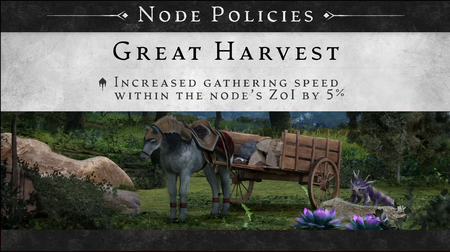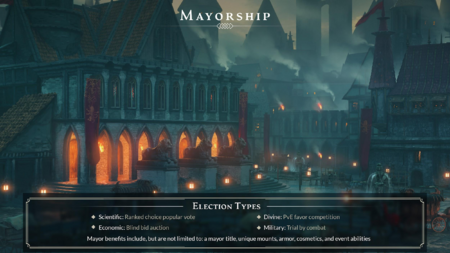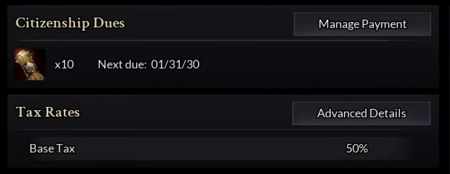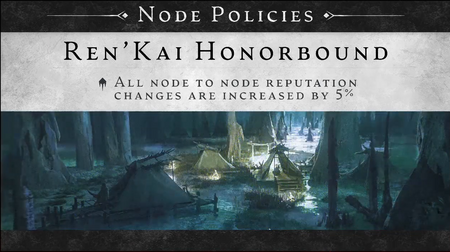Node leadership powers

The government has a lot of say in the direction of the node's development. Directing assets, building projects, tax allocation, defensive ability etc. Players have the ability to not only create these cities, but they have the right of self-governance.[2]
Mayoral leadership powers are granted to mayors via the use of mandates.[3][4]
- Initiate buy orders using gold from the node treasury.[5][6][7][8]
- Initiate mayoral commissions to aid node development.[5][9][7][3][10][2]
- Adjust node taxes.[5][3][11] This includes setting tax rates that apply to tavern games.[12][13]
- Tax money may only be used to fund node development.[14]
- Initiate service building construction and expansions.[5][3]
- Improving node defensive structures, such as stronger walls and gates, traps, and siege equipment.[10][15][16][17][2]
- Hiring mercenary NPCs to defend the node during sieges.[18][2]
- Set a message-of-the-day for the node.[19]
- Proposing node policies that are voted on by citizens.[20][21][10]
- Mayors won't have formal systems to carry out surveys/polls of node citizens, but they will be able to utilize node citizen chat or message-of-the-day services.[19]
- Mayors may have special color names in node chat channels.[19]
- Entering into trade agreements with other nodes.[5][20][22]
- Mayors cannot denote players as enemies of the state.[24] Previously this was a potential option.[22][25]
- Mayors are notified when their node is named on a siege declaration scroll.[26]
- Mayors and lords of castles have spells they can use on the battlefield with high effect and long cooldowns for their teams.[27]
- Mayors gain new powers and responsibilities as their node advances.[30]
- Some leadership powers are specific to node type, biome, or dominant race, others are universal.[31]
- There definitely are differences... Some of the things that mayors can do are more universal, but then some systems have very specific if your node has a certain dominant race, or your node is a certain type, or it's in a certain biome. So there's even differences between where it is too.[31] – Chris Justo
- If a mayor does not make certain decisions within a set period of time then the system will make a decision for them.[33][34]
- Q: The idea behind all these nodes are awesome, but I wonder how it will actually play out in the live version. The problem is having player run or the problem with having player run towns is that people come and go in video games. So, will towns die out etc?
- A: We incorporate as part of those designs certain fail-safes, certain protections, certain automated progression that takes over when some of those decisions are lacking or are not made; and those decisions can be defaulted. Now, of course, that would have a deleterious effect on the direction that a particular node might want to go, because they're going to be doing default behaviors, or default actions, as opposed to something that might be in line with the strategic objective of that particular node, or the specialization that the node has previously been attempting to do. But that is why we have a regularly recurring election period where players can take the reins of power and can elect someone else to come in and participate and and re-right the ship, so to speak. So it is absolutely a component of having player-driven mechanics that there is an opportunity for things to be less than ideal, or less than strategic when certain bad-faith actors or people leave, but there are safeguards in place.[33] – Steven Sharif
Mayors

Mayors have a unique ability to elicit change within the node proper, either through the destruction of certain buildings that have been constructed previously, because there's a limited number of slots that buildings can be constructed within, or the kickoff of additional projects, or the certain types of policies that can be enacted, like... the changing of a tax rate. They all have a unified source of energy requirement and the energy requirement is a mandate.[3] – Steven Sharif
Mayors are chosen through different election methods according to the node's type.[40][30]
- Only node citizens may be elected mayor.[41]
- Previous mayors won't have any special system driven bonuses to help them get reelected.[43]
- Kings and Queens can also become a mayors.[41]
- Mayoral leadership powers are granted via the use of mandates.[3][4]
- Players will be able to view a historical listing of mayors of a node.[44]
Node policies

Nodes have a number of slots that they get to employ as Government policies that are enacted and chosen by the mayor and voted on by the people; and certain policies get unlocked by certain happiness states of the factions within the node; and those happiness states are predicated across different achievements that can happen in the world story arcs that get finished; bosses that get killed around you; new buildings that get constructed: Lots of different things can contribute to that happiness value: Number of citizens; number of citizens you've had leave; number of houses that might have been foreclosed upon. There's lots of different things that influence it, but when the happiness is met at a certain point- and even without that happiness you can still have policies that you get to enact regardless. You may choose policies that do certain things for the node; and this is a big strategic decision that the node has to almost agree on because it's voted on by the citizens within a short time period, but elected by the outstanding mayor; and when you deploy a policy it confers benefits to the citizens, or to the area, or to specific buildings, or to the mayor.[21] – Steven Sharif
Node policies affect a variety of node functions, such as taxes and fees, building and zone buffs, and node-to-node reputation activities, such as trade agreements, and node wars.[5][20]
- Mayors propose node policies that are voted on by citizens within a 24-hour or shorter time period.[5][20][21][10]
- Policies are voted in if the majority of voters approve of them.[45]
- Mayors can utilize their available mandates to bypass policy votes.[5][20][3]
- Mayors may also be able to take emergency actions depending on certain predicates that get met. This might allow them to reduce the voting threshold or voting time for policies.[45][21]
- There are a limited number of policy slots available to be proposed.[5][20] Some policies occupy multiple slots.[21]
- Node policies that are deployed will provide benefits to various aspects of the node, its citizens, its ZOI, its vassals (in some cases), specific buildings, and to its mayor.[45][21]
- Certain policies may affect the visual appearance of the node.[46]
- Some of the benefits you can receive by being a vassal of a certain parent is access to a policy that your node not might not normally have access to; and in fact you can also unlock an additional policy slot based on certain conditions that the parent or Sovereign node may have access to in their reliquary, or in their achievement systems, or in policies that they've elected. Some policies occupy multiple slots and it's almost like a card structure. You have each of these policies that live on a card and you get to select that card- throw it into the slot it goes out to the citizens to vote on within the 24-hour or sometimes shorter period. The mayor has emergency actions they can take right depending on certain predicates that get met and if an emergency action occurs they may be able to spend their influence as mayor within their term to set up a policy for a vote within an hour's period of time; and citizens in that way they can sneak it through a bit.[21] – Steven Sharif
Policies are unlocked by various conditions within a node.[5][20][21][10]
- Node level.[5][20]
- Node type.[5][20]
- Dominant node race.[5][20][21]
- Building choices.[5][20][21]
- Location of the node.[5][20]
- Events, such as node wars and node sieges.[45][5][20]
- Node happiness.[5][20][47][48]
- Achievements based on the completion of story arcs.[21]
- World bosses that are defeated.[21]
- Node citizens gained (or lost).[21]
- Node housing foreclosed upon.[21]
- There's a lot of different things that policies can influence; and policies exist within certain denominations. You have some policies that might be reflective of the culture that the node is representing; and you get access to those cultural policies. You have some policies that might become available because you've constructed a certain building type and now you've attracted a guild of NPCs that are weapons smiths. You might have some policies that are social organizations representative- you only get to build one social organization or Temple: which religion does the node follow. All of these are customization points that the city gets to choose and now you as a citizen get to identify the city that best aligns with your progression within the game and your game style and gameplay.[21] – Steven Sharif
Node elections

The village stage is a unique stage because that's when the government system comes online and all other stages past village there will have already been a cadence for the election system and it will follow that cadence, but after the initial village stage is completed there will be a one week period where players have an opportunity to establish citizenship at the village that also provides for the cooldown time that is- that would be present on players leaving another node to participate in in this particular node leveling up. But that after that one week period then there will be a one-week election process and then from that point moving forward will be the one month cadence that the node experiences elections on.[50] – Steven Sharif
Once a node has reached Village (stage 3) there will be a one week cooldown period before node elections begin.[50]
- This cooldown period allows players to establish citizenship at the village; which may require them to relinquish previous citizenship at another node.[50]
- Following the initial cooldown, there will be a one week election process, then from that point on, elections will follow a monthly cadence.[50]
- Node sieges may not be declared for 21 days following a node advancing to any stage.[51]
Node elections occur on a monthly basis.[50][53]
- Election notices will be mailed to the accounts of citizens.[54]
- Only citizens of a node may participate in its elections.[2]
- Only node citizens may be elected mayor.[41]
- A king or queen can also become a mayor.[41]
Node election types
Mayors are chosen through different methods according to the node's type.[40][30]
- Divine node mayors are elected based on the citizen who earns the most PvE favor with the node.[5][55][56][40]
- Most of the devotion-oriented tasks are going to be on an individual basis and won't utilize outside support.[57]
- Economic node mayors are elected via a blind-bid auction where the citizen bidding the most money wins.[5][55][56][40] This is a gold sink.[58]
- Military node mayors are elected based on trial by combat. During the election week the node will enter an open-PvP battleground state for hour-long periods where candidates (and their citizen supporters) compete to gain points by securing objectives. The highest point winner at the end of the week will win.[5][55]
- Academic node mayors are elected via ranked choice popular vote.[5][55]
- This was previously a single popular vote system.[56][40] Records of who voted for who are not published.[54]
Taxation
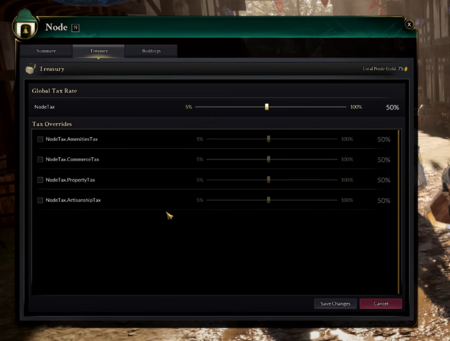
As the node levels up, you're gonna get access to deeper controls on the taxes, so that you as a Mayor can incentivize players to come to your node to do certain things. If you're a node that loves smithing, you're probably going to want to lower your taxes on artisanship to incentivize players to be here. But then you might want to drive up taxes on other avenues that players aren't necessarily coming to your node for, but are using out of convenience.[64] – Chris Justo
Mayors are able to set a generalized node tax rate as well as overrides for different activities within their node. Mayors gain additional taxation controls as their node advances.[64][11]
- Amenities tax override.[64]
- Artisanship tax override.[64]
- Commerce tax override.[64]
- This may include taxes that apply to tavern games.[12][13]
- Property tax override.[64]
- Freehold property taxes scale according to the number of freehold building permits issued for that freehold.[65][66][14]
- Citizenship dues and property taxes scale based on the stage of the node when a player became a citizen.[5][67][68][69][70]
- The goal is to exert financial pressure on node populations by making taxes increasingly expensive as nodes advance, rather than putting in place hard population caps.[68][69]
- Node tax rates will be visible on the world map by hovering over a node location.[71]
- Tax revenue only goes toward funding node development. This cannot be withdrawn by the mayor or any other player.[72][14]
Regent nodes take a cut of taxes from various activities that occur within their vassal node structure.[72][73]
- This tax doesn't necessarily impact the individual citizen, because citizen's tax levels are determined by their node, but the node's finances are affected by the taxation levied by its parent nodes.[73]
When a node reaches stage 3 (Village) and a player run government has formed, all player housing will pay taxes.[74]
- A player's tax charge will be determined by the number of structures built on their plot.[66][14]
- Freehold taxes are calculated based on the number of permits issued for buildings on a freehold.[75][76][65][66][14]
- Buildings that require permits will have additional upkeep costs.[75]
- Maintaining businesses requires licensing and payments to the node your Freehold is associated with. This permitting system allows for a certain number of buildings to be constructed on a Freehold. Permits can be obtained from the same node the Freehold was certified from, and buildings that require permits will have an additional upkeep cost.[75]
- Housing foreclosures result from failing to pay property taxes or other fees.[75]
Node layout and style
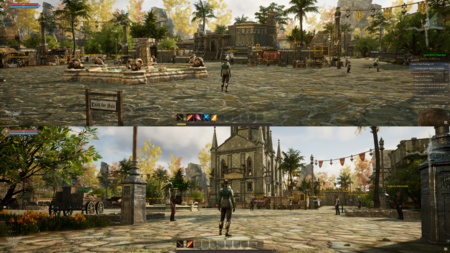
The layout and architecture within a Node’s development area are determined by influential race. For example, a stage 3 Node with the majority of player contribution being Py'rai would have a Py'rai village with Py'rai architecture. Most NPCs would be Py'rai elves, and offer questlines within the Py'rai narrative.[30] – Margaret Krohn
Each player’s contributed experience is flagged with their character race and other identifiers. When a Node advances, the race with the highest experience contribution determines the Node’s style and culture. This style and culture change can happen at every Node Stage. For example, if a Node advances to Level 2 - Encampment Stage and 51% of all experience was earned by Ren’Kai players, the Node will be a Level 2 Ren’Kai Node. If that same Node advances to a Level 3 - Village Stage Node, but the Py'Rai contributed 62% of all the experience earned, then the Node will be a Level 3 Py'Rai Node.[77] – Margaret Krohn
Node layout and style is determined by several factors:[78][79]
- The way that the node system is built is that they can exist across a spread of 18 biomes, but at the same time have to represent the cultural influence of these cultures that are intrinsically a part of a specific biome.[80] – Steven Sharif
- Environment (biome) and location of the node.[80][78][79]
- Nodes will adjust the local topography to fit the aesthetic and mechanical requirements of the node.[81]
- Currently the way that the platform system is set up, is it's capable of adjusting the topography of the node's footprint, regardless of the surrounding terrain. So the reason for that is we want to have flexibility in the presentation of the node's layout and how it is essentially both from an aesthetic standpoint as well as a mechanical standpoint with node sieges- how it's constructed and that construction should have the ability to take on a variance of different types of topography. So it shouldn't be dependent on the surrounding area. Now that's not to say that the surrounding area isn't going to have some influence over. So for example... we're experimenting a little bit with the platform tech and putting up a node up against the side of a mountain or on the edge of a cliff or something that has a beautiful vista. Those are things that we're going to test out obviously as we continue to work on the node tool and how that platform system works, but the idea is to have the node independent of the surrounding terrain.[81] – Steven Sharif
- Some parts are determined by the area it's in. Some parts are determined by the type it is. Some parts are determined by the race it is; and then the rest of it is determined by the mayor.[79] – Jeffrey Bard
- Race that contributed the highest percentage to the node's advancement will alter the racial appearance of its buildings, NPCs, and props.[82][83][78][77][79][84][85]
- All nodes, whether they're associated with a castle or associated with normal node structure, has cultural influences that replicate over to the buildings that are produced and the NPCs that are present.[87] – Steven Sharif
- The rest is determined by the node's mayor.[79]
- It should be possible for a node to complete several building projects within a mayor's one month term in office.[88]
- Q: How long would you say it will take players on average to fill/build up a node completely from wilderness to metropolis?
- A: It's one thing to get a node to a certain level: it's another thing to develop the node; and I can't really give you an on-average expectation, because there's a lot of variables at play. There's how many citizens does the node have attracted to it; what's the type of traffic that the node is attracting to it based on things like its tax rates, or the specialization that it chose to spec into, based on the building types it's chosen to build. All of those things are variables that can affect the quote-unquote "average build-out time" of a particular node. So it's difficult to give you an average when there's so many variables along those lines. But the idea is that if there is a particular project that players are interested in in developing based on the node stage, that they would have the ability to complete several of those projects as within a single term of a mayor; and a term of a mayor is one month.[88] – Steven Sharif
Service buildings
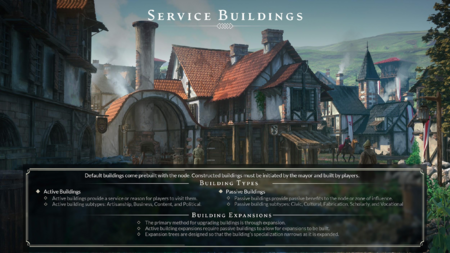
The important thing with the service building system for us is that it's a way to shape your node like a character; and to give you an exclusive niche that you can carve out in the world; or a niche that you fight over. If you go down this weaponsmithing path and you build your node to be this mecca of weaponsmithing and the node three doors down builds it, there's reason for you to conflict over it. They're taking your business. Or maybe you are in a zone and there isn't a weaponsmithing thing anywhere near you, and you do want to start to carve that path for yourself to make your node a place people visit and come to.[89] – Chris Justo
Service buildings within a node are either default buildings that come with the node, or they are constructed buildings, which are initiated by the mayor and built by players.[5][89][90][91][92][93][94] Service buildings are further broken down into two main types:[5][89]
- Active service buildings are service buildings that players directly interact with. These are further broken down into Artisanship, Business, Content, and Political categories.[5][89]
- Passive service buildings provide passive benefits to the node or its zone of influence. These buildings are broken down into Civic, Cultural, Fabrication, Scholarly, and Vocational.[5][89]
- Constructed service buildings are available to every type of node in every location. Where the uniqueness comes in is in some of the default buildings like your node-type building.[95] – Chris Justo
Service buildings are upgraded by expansions, which are unlocked through the placement of passive service buildings.[5][89]
- Building expansions unlock higher tier workstations at the cost of dedicating service building plots.[96][92]
- Node service building expansions specialize the building through a tech tree based on the stage of the node.[97][98]
Service buildings incur a regular maintenance cost of node commodities and gold from the node treasury in order to continue operations.[5][99]
Node politics
There won't be a civil war mechanic within nodes but there will be scope for internal political conflicts; such as undermining the current leadership and disrupting trade.[100]
- The only way to remove an elected mayor prior to the end of their term is by destroying the node.[101]
We want consequences to matter and if that person got elected then you need to work within the means of the mechanics to get them unelected.[101] – Steven Sharif
Node-to-node reputation
Node-to-node reputation activities include trade agreements and wars between nodes.[5][20]
- Completing mayoral commissions will reward node-to-node reputation.[5][9]
See also
References
- ↑ Livestream, December 12, 2018 (14:48).
- ↑ 2.0 2.1 2.2 2.3 2.4 2.5 2.6 2.7 MMOGames interview, January 2017
- ↑ 3.0 3.1 3.2 3.3 3.4 3.5 3.6 Livestream, August 31, 2023 (31:44).
- ↑ 4.0 4.1 Livestream, November 17, 2017 (9:49).
- ↑ 5.00 5.01 5.02 5.03 5.04 5.05 5.06 5.07 5.08 5.09 5.10 5.11 5.12 5.13 5.14 5.15 5.16 5.17 5.18 5.19 5.20 5.21 5.22 5.23 5.24 5.25 5.26 5.27 5.28 5.29 5.30 5.31 5.32 Blog: Development Update with Village Node.
- ↑ Livestream, August 31, 2023 (59:43).
- ↑ 7.0 7.1 Interview, July 8, 2020 (1:04:05).
- ↑ 8.0 8.1 Livestream, June 30, 2017 (53:57).
- ↑ 9.0 9.1 Livestream, August 31, 2023 (39:17).
- ↑ 10.0 10.1 10.2 10.3 10.4 10.5 Livestream, April 29, 2022 (27:42).
- ↑ 11.0 11.1 Livestream, March 28, 2020 (1:03:38).
- ↑ 12.0 12.1

- ↑ 13.0 13.1

- ↑ 14.0 14.1 14.2 14.3 14.4

- ↑ Livestream, July 25, 2020 (1:22:40).
- ↑ Livestream, January 18, 2018 (37:05).
- ↑

- ↑ Livestream, June 26, 2020 (59:11).
- ↑ 19.0 19.1 19.2 Livestream, August 31, 2023 (35:23).
- ↑ 20.00 20.01 20.02 20.03 20.04 20.05 20.06 20.07 20.08 20.09 20.10 20.11 20.12 20.13 20.14 20.15 Livestream, August 31, 2023 (44:21).
- ↑ 21.00 21.01 21.02 21.03 21.04 21.05 21.06 21.07 21.08 21.09 21.10 21.11 21.12 21.13 21.14 21.15 21.16 Livestream, August 26, 2022 (1:12:40).
- ↑ 22.0 22.1 22.2 City hall.
- ↑ Livestream, August 31, 2023 (29:04).
- ↑ Livestream, August 31, 2023 (30:41).
- ↑
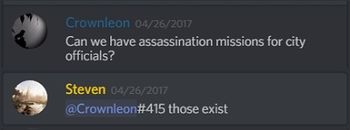
- ↑ Livestream, December 23, 2021 (1:30:34).
- ↑ 27.0 27.1

- ↑ Livestream, July 25, 2020 (1:52:45).
- ↑ Livestream, August 31, 2023 (41:15).
- ↑ 30.0 30.1 30.2 30.3 Blog - Know Your Nodes - The Basics.
- ↑ 31.0 31.1 Livestream, August 31, 2023 (28:30).
- ↑
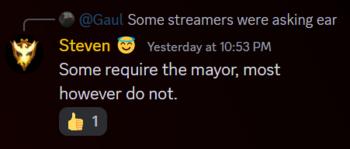
- ↑ 33.0 33.1 Video, September 29, 2023 (1:52).
- ↑ Livestream, August 31, 2023 (29:33).
- ↑

- ↑ Livestream, May 19, 2017 (36:05).
- ↑ Livestream, May 19, 2017 (36:09).
- ↑
- ↑

- ↑ 40.0 40.1 40.2 40.3 40.4 Node series part II – the Metropolis.
- ↑ 41.0 41.1 41.2 41.3 41.4 41.5

- ↑ 42.0 42.1 Interview, May 11, 2018 (50:05).
- ↑ Livestream, August 31, 2023 (37:35).
- ↑ Livestream, September 29, 2023 (1:05:44).
- ↑ 45.0 45.1 45.2 45.3 Livestream, August 31, 2023 (47:43).
- ↑ Livestream, August 31, 2023 (49:13).
- ↑ 47.0 47.1 Livestream, April 7, 2023 (1:19:41).
- ↑ 48.0 48.1 Livestream, August 26, 2022 (1:17:04).
- ↑ Livestream, March 28, 2020 (1:01:34).
- ↑ 50.0 50.1 50.2 50.3 50.4 Interview, March 27, 2020 (6:03).
- ↑
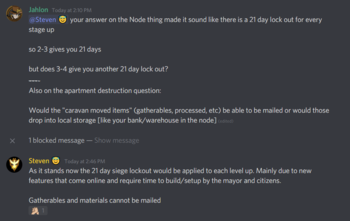
- ↑

- ↑

- ↑ 54.0 54.1 Livestream, October 30, 2020 (1:01:00).
- ↑ 55.0 55.1 55.2 55.3 55.4 Livestream, August 31, 2023 (24:54).
- ↑ 56.0 56.1 56.2 56.3 Interview, July 19, 2020 (26:54).
- ↑ Livestream, March 26, 2021 (1:18:26).
- ↑ Livestream, October 31, 2023 (1:35:22).
- ↑ Livestream, November 19, 2021 (51:56).
- ↑

- ↑ Interview, March 27, 2020 (09:05).
- ↑ Livestream, March 26, 2021 (1:17:20).
- ↑ Podcast, May 11, 2018 (52:20).
- ↑ 64.0 64.1 64.2 64.3 64.4 64.5 64.6 64.7 Video, August 31, 2023 (28:04).
- ↑ 65.0 65.1 Interview, July 9, 2023 (54:46).
- ↑ 66.0 66.1 66.2 Livestream, June 30, 2023 (1:45:22).
- ↑ Livestream, August 31, 2023 (15:51).
- ↑ 68.0 68.1 Interview, July 9, 2023 (38:14).
- ↑ 69.0 69.1 Interview, March 27, 2020 (0:30).
- ↑ Video, April 5, 2018 (41:48).
- ↑ Livestream, September 29, 2023 (1:11:22).
- ↑ 72.0 72.1 Livestream, August 26, 2022 (1:10:16).
- ↑ 73.0 73.1 Interview, May 11, 2018 (57:02).
- ↑

- ↑ 75.0 75.1 75.2 75.3 Blog: Exploring the Boundless Opportunities of Freeholds.
- ↑

- ↑ 77.0 77.1 77.2 Blog - Know Your Nodes - Advance and Destroy.
- ↑ 78.0 78.1 78.2 Livestream, October 30, 2020 (39:17).
- ↑ 79.0 79.1 79.2 79.3 79.4 79.5 Livestream, September 27, 2018 (53:06).
- ↑ 80.0 80.1 Livestream, February 25, 2022 (41:00).
- ↑ 81.0 81.1 Livestream, February 26, 2021 (1:12:18).
- ↑ Livestream, March 31, 2022 (4:57).
- ↑ Podcast, April 11, 2021 (29:47).
- ↑ Interview, May 11, 2018 (54:34).
- ↑ Livestream, May 26, 2017 (21:23).
- ↑ Podcast, April 11, 2021 (23:36).
- ↑ 87.0 87.1 Interview, May 11, 2018 (47:27).
- ↑ 88.0 88.1 Livestream, July 29, 2022 (1:13:09).
- ↑ 89.0 89.1 89.2 89.3 89.4 89.5 89.6 Livestream, August 31, 2023 (50:25).
- ↑ Video, August 31, 2023 (2:59).
- ↑ Interview, July 9, 2023 (1:32:45).
- ↑ 92.0 92.1 Livestream, May 19, 2017 (33:57).
- ↑ Livestream, January 20, 2018 (38:17).
- ↑ Livestream, 2018-04-8 (PM) (51:49).
- ↑ Livestream, August 31, 2023 (56:18).
- ↑ Livestream, August 31, 2023 (52:56).
- ↑ Video, August 31, 2023 (34:37).
- ↑ Livestream, March 31, 2022 (1:13:00).
- ↑ Livestream, August 31, 2023 (57:23).
- ↑ Livestream, May 24, 2017 (40:50).
- ↑ 101.0 101.1 Livestream, June 28, 2019 (1:26:14).
